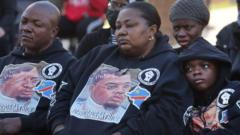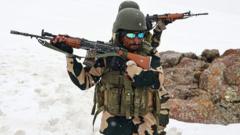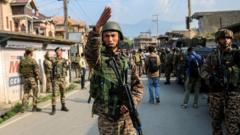In Balochistan, a region steeped in conflict and sorrow, women like Saira Baloch embark on grim journeys through morgues, searching for their missing relatives amid tales of abuse and neglect.
Searching for Lost Loved Ones: The Struggles of Baloch Women

Searching for Lost Loved Ones: The Struggles of Baloch Women
Women in Balochistan endure emotional pain as they seek answers about missing family members believed to be victims of enforced disappearances by security forces.
Saira Baloch faced the agony of stepping into a morgue for the first time at just 15. The poignant atmosphere was filled with the sounds of mourning, and her heart raced as she surveyed rows of unclaimed bodies. The haunting image of a tortured man, with his eyes gouged and teeth pulled, is one she'll never forget. For nearly seven years, she has been searching for her brother, Muhammad Asif Baloch, a police officer who vanished after being arrested during a counter-terrorism operation in Balochistan in 2018.
The province, renowned for its rich natural resources, is afflicted by a lengthy history of enforced disappearances, particularly among ethnic Baloch people, with families claiming that many are victims of state oppression. Authorities repeatedly dismiss these allegations, attributing many missing cases to individuals joining insurgent groups or fleeing violence. Despite government proclamations, grieving families continue to feel abandoned, holding photographs of lost loved ones while participating in protests for justice.
Balochistan's landscape reflects its political turmoil, with its remote villages characterized by dilapidated infrastructure and a lack of basic services. The cultural and economic neglect of Balochistan is deeply intertwined with a fierce nationalist sentiment, leading to a cycle of violence and confrontations with state forces. Armed groups such as the Balochistan Liberation Army have intensified their operations, while government responses often result in more disappearances.
Women like Jannat Bibi, searching for her son who vanished a decade ago, and Mahrang Baloch, who leads protests after her father's enforced disappearance, exemplify the strength and resolve of Baloch families. They refuse to be silent or surrender to despair, even when faced with threats and opposition.
The rise in protests reflects not only a demand for justice but also a desire for acknowledgment from the government of the ongoing human rights violations. As children like 10-year-old Masooma join the struggles of their mothers, the quest for truth and reconciliation in Balochistan becomes an unending battle waged against both time and a callous state apparatus. As the cries of grieving families echo in the streets, their determination remains unbroken: "Silence is not an option."
The province, renowned for its rich natural resources, is afflicted by a lengthy history of enforced disappearances, particularly among ethnic Baloch people, with families claiming that many are victims of state oppression. Authorities repeatedly dismiss these allegations, attributing many missing cases to individuals joining insurgent groups or fleeing violence. Despite government proclamations, grieving families continue to feel abandoned, holding photographs of lost loved ones while participating in protests for justice.
Balochistan's landscape reflects its political turmoil, with its remote villages characterized by dilapidated infrastructure and a lack of basic services. The cultural and economic neglect of Balochistan is deeply intertwined with a fierce nationalist sentiment, leading to a cycle of violence and confrontations with state forces. Armed groups such as the Balochistan Liberation Army have intensified their operations, while government responses often result in more disappearances.
Women like Jannat Bibi, searching for her son who vanished a decade ago, and Mahrang Baloch, who leads protests after her father's enforced disappearance, exemplify the strength and resolve of Baloch families. They refuse to be silent or surrender to despair, even when faced with threats and opposition.
The rise in protests reflects not only a demand for justice but also a desire for acknowledgment from the government of the ongoing human rights violations. As children like 10-year-old Masooma join the struggles of their mothers, the quest for truth and reconciliation in Balochistan becomes an unending battle waged against both time and a callous state apparatus. As the cries of grieving families echo in the streets, their determination remains unbroken: "Silence is not an option."






















